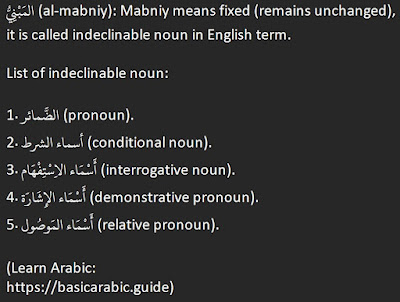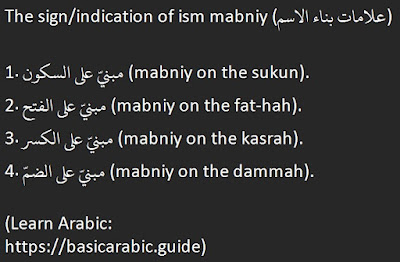Which are considered to be ism mabniy? | اسم مبنيّ
Definition
- البِنَاء (al-binaa'): The harakat at the end of the word does not change even if it is modified by 'amil.
- المَبْنِيُّ (al-mabniy): A word that remains unchanged in its final letter, even if 'amil is modified into it.
- المُعْرَبُ (al-mu'rab): A word that changes in its final letter when 'amil is modified into it.
- Definition of a noun in Arabic
al-mu'rab and al-mabniy comparation
a. al-mu'rab
Let's take an example of this word "المَكْتَبُ"
Let's take one example of the 'amil => har jar "عَلَى"
if "المَكْتَبُ" is inserted by (preceded by) "عَلَى", the final harakat of "المَكْتَبُ" changes, it becomes kasrah "i".
Finally, it becomes "عَلَى المَكْتَبِ".
so, مكتب is ism mu'rab.
b. al-mabniy
Now, let's see one example of ism mabniy => ism isharah "هَذَا".
b1. هَذَا in nominative case
هَذَا كِتَابٌ = This is a book.
هَذَا is mubtada' (the grammatical role is as mubtada'). The condition of هَذَا is mabniyy 'ala as-sukun, fi mahalli raf'in mubtada' (hadha is mabniy on sukun, in this sentence, it is acted as mubtada' marfu').
b2. هَذَا in accusative case
Let's see هَذَا as a maf'ul bih mansub in the following sentence:
نَصَحْتُ هَذَا الوَلَدَ = I advised the boy.
In this sentence, condition of "هَذَا" is mabniyy 'ala as-sukun, fi mahalli nasbin maf'ul bih (hadha is mabniy on sukun, it is acted as maf'ul bih mansub).
You can notice that "هَذَا" remains unchanged even in marfu' condition (in nominative case) or in mansub condition (in accusative case).
So, هَذَا is ism mabniy.
Recap of al-mabniy vs. al-mu'rab
Mabniy means fixed (remains unchanged), it is called indeclinable noun in English term.
Mu'rab means declinable, the ending changes according to its grammatical role in a sentence or if it is modified/inserted by 'amil, it is called declinable noun.
List of ism mabniy (الأسماء المبنيات)
Here are the ism mabniy:
1. الضَّمائر (pronoun).
Examples: هُوَ, هِيَ, etc.
2. أسماء الشرط (conditional noun).
Examples : مَنْ, مَا, مَتَى, مَهْمَا, etc.
3. أَسْمَاء الاِسْتِفْهَام (interrogative noun).
Examples: أَيْنَ, كَيْفَ, مَنْ, مَتَى, كَمْ, etc.
4. أَسْمَاء الإِشَارَة (demonstrative pronoun).
Examples: هَذَا, ذَلِكَ, هَذِهِ, etc.
5. أَسْمَاء المَوصُول (relative pronoun).
Examples: الَّذِي, الَّتِي, etc.
The sign/indication of ism mabniy (علامات بناء الاسم)
1. مبنيّ على السكون (mabniy on the sukun).
Examples: هُمْ, أَنَا, هَذَا, أَنْتُمْ
2. مبنيّ على الفتح (mabniy on the fat-hah).
Examples: أَيْنَ, أَنْتَ, كَيْفَ
3. مبنيّ على الكسر (mabniy on the kasrah).
Examples: هَذِهِ, أَنْتِ
4. مبنيّ على الضمّ (mabniy on the dammah).
Examples: نَحْنُ, حَيْثُ
Lesson Summary
1. List of indeclinable/fixed noun/ism mabniy
2. The 'alamaat (signs) of ism mabniy
======
Related lesson:
I strongly recommend you to restudy these lessons:
- The indication of marfu' (nominative case)
- The indication of mansub (accusative case)
- The indication of majrur (genitive case)




No comments:
Post a Comment